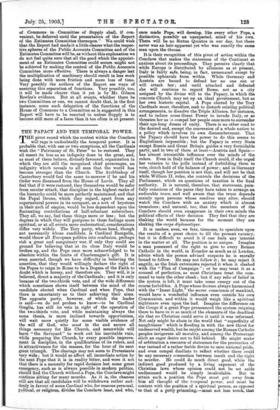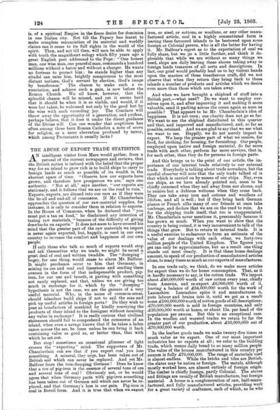THE PAPACY AND THE TEMPORAL POWER.
T"pivot round which the contest within the Conclave will rage is -undoubtedly the temporal power, It is probable, that, with one or two exceptions, all the Cardinals wish the " Patrimony of St. Peter" to be restored. They all resent its loss as an indignity done to the great, and, as most of them believe, divinely favoured, organisation in which they are still the recognised chief personages, an indignity which reveals to all men that the world has become stronger than the Church. The Archbishop of Canterbury would feel the same to-morrow if he and his Order were dismissed from the House of Lords. They all feel that if it were restored, they themselves would be safer from secular attack, that discipline in the highest ranks of the hierarchy could be more perfectly maintained, and that the Papal throne, which they regard, apart from any supernatural powers in its occupant, as a sort of keystone in their arch of empire, would be less dependent upon the fluctuating contributions of half-reluctant subscribers. They all, we say, feel these things more or less ; but the degrees in which they will postpone to these feelings more spiritual, or at all events more ecclesiastical, considerations differ -very -widely. The Tory party, whose head, though not necessarily whose candidate, is Cardinal Rampolla, would throw all European politics into confusion, perhaps risk a great and sanguinary war, if only they could see ground for believing that at its close Italy would be broken up, and the Pope once more acknowledged to be absolute within the limits of Charlemagne's gift. It is even asserted, though we have difficulty in believing the assertion, that they would willingly declare the right of the Popes to reign in Rome to be a Dogma of the Faith to doubt which is heresy, and therefore sin. They will, it is believed, direct a majority of the Cardinals ; and it is only because of the two-thirds vote, and of the wide difference which sometimes shows itself between the mind of the candidate elected when Cardinal and when Pope, that there is uncertainty as to their achieving their aims. The opposite party, however, of which the leader is said—we do not profess to know—to be Cardinal Oreglia, has still its veto in right of the operation of the two-thirds vote, and while maintaining always the same thesis, is more inclined towards opportunism, will wait more quietly for some visible evidence of the will of God, who must in the end secure all things necessary for His Church, and meanwhile will leave "the Savoyard" to work out • his inevitable ruin, while .preparing the Church, by every possible improve- ment in discipline, in the qualifications of its rulers, and in attractiveness for the masses, for the hour of its next great triumph. The cleavage may not seem to Protestants very wide ; but it would so affect all immediate action by the next Pope that it is in reality bitter, and were it not that there is a necessity for rapid decision lest, some great emergency, such as is always ,possible in modern politics, should find the Church without a Pope, the Conclave might continue sitting for many months. As it is, the chances still are that all candidates will be withdrawn rather sud- denly in favour of some Cardinal who, for reasons personal, political, or religious, divides the Conclave least, and who, once made Pope, will develop, like every other Pope, a distinctive, possibly an unexpected, • minds of his own. There will be no Sixtus Quintus in our day, but there never was an heir-apparent yet who was exactly the same man upon the throne.
It is their recognition of this pivot of action within the Conclave that makes the statesmen of the Continent sie anxious about its proceedings. They perceive clearly that while Europe is distributed by alliances as at present, Italy 'is fairly safe, being, in fact, unmenaced except by possible upheavals from within. While Germany and Austria are bound to defend her no one can or will attack her; and until attacked and defeated she will continue to regard Rome, not as a city assigned by the divine will to the Papacy, in which the concrete Church may set up an ideal government, but as her own historic capital. A Pope elected by the Tory Cardinals must, therefore, seek to disturb existing political arrangements, to dissolve the Triple Alliance, for instance, and to induce some Great Power to invade Italy, or so threaten her as 'a) compel her people once more to surrender their age-long dream of unity. There is no other road to the desired end, except the conversion of a whole nation to a policy which involves its own dismemberment. That the Papacy should have the power to do this seems to Englishmen impossible ; but the Papacy in every State except Russia and Great Britain guides a very formidable party, and in two of them at least—Austria and Spain— has almost irresistible influence over the minds of the rulers. Even in Italy itself the Church could, if she urged. her votaries to the polls instead of forbidding them to vote, clutch hold of the balance of power ; and in Germany itself, though her position is not that, and will not be that while William II. rules, she controls the decisions of the Parliament, which on questions of taxation is the final authority. It is natural, therefore, that statesmen, pain- fully conscious of the pains they have taken to arrange an endurable truce, and well aware that the truce depends mainly upon persons whose resolves may alter, should watch the Conclave with an anxiety which is almost tremulous ; and natural, too, that the members of the Conclave should even exaggerate in their own minds the political effects of their decision. They feel that they are shaking the world because for the moment they are shaking the corps.diplomatique.
It is useless, even, we fear, tiresome, to speculate upon the results of a great choice to fill the present vacancy, but it is difficult to avoid it if one feels any interest in the matter at all. The position is so unique. Imagine a man possessed of the right to give to every Roman Catholic in the world, in Ecuador as much as in London, advice which the person advised suspects he is morally bound to follow. He may not follow it ; he may reject it angrily, as the Irish extremists rejected it when it clashed with the " Plan of Campaign " ; or he may treat it as a counsel of perfection, as most Christians treat the com- mand to turn the other cheek ; but if any relic of belief in the system is left, it must take some energy out of the course forbidden. A Pope whose decrees always harmonised. with the " Inner Light," the secret conscience of mankind, would have a wonderful influence even outside his own Communion, and within it would weigh like a spiritual nightmare even upon the bad. Imagine the difference on the Congo if a great Pope pronounced the system reigning there to have in it so much of the elements of the deadliest sin that no Christian could serve it until it was reformed. Not only might he abate in the world that " superfluity of naughtiness ' which is flooding in with the new thirst for undeserved wealth, but he might among the Roman Catholic peoples invigorate all morality, and among the Protestant elicit an eager desire not to fall behind. He might make of arbitration a resource of statesmen for the prevention of war instead of a rather feeble device to save national pride, and even compel duelists to reflect whether there could be any necessary connection between insult and the right to murder. He could do much direct good, while the indirect good produced by a living exponent of the Christian laws whose opinion could not be set aside undiscussed would be simply incalculable. But to attain such a position the Pope must put away from him all thought of the temporal power, and must be content with the position of a spiritual person, as opposed to that of a petty .princeling,—must not lose touch, that is, of a spiritual Empire in the fierce desire for dominion in one Italian city. Not till the Papacy has learnt to make complete renunciation of its material and worldly claims can it come to its full rights in the world of the spirit. Then, and not till then, will men be able to apply with truth the magnificent eulogy which fifty years ago a great English poet addressed to the Pope : " One honest man, one wise man, one peaceful, man, commands a hundred millions without a baton and without a charger. He wants no fortress to protect him ; he stands higher than any citadel can raise him, brightly conspicuous to the most distant nations, God's servant by election, God's image by beneficence." The chance to make such a re- nunciation, and achieve such a gain, is now before the Roman Church. We all know, however, that the splendid chance will be missed, and yet it seems hard that it should be when it is so visible, and would, if it were but taken, be welcomed not only by the good but by the wise with such exceeding joy. The Conclave will throw away the opportunity of a generation, and profess, perhaps believe, that it does it under the direct guidance of the Divine will. Can one wonder that scepticism has often among those born Roman Catholics a note of scorn for religion, as a mere aberration produced by terror, which among Protestants it usually lacks ?







































 Previous page
Previous page